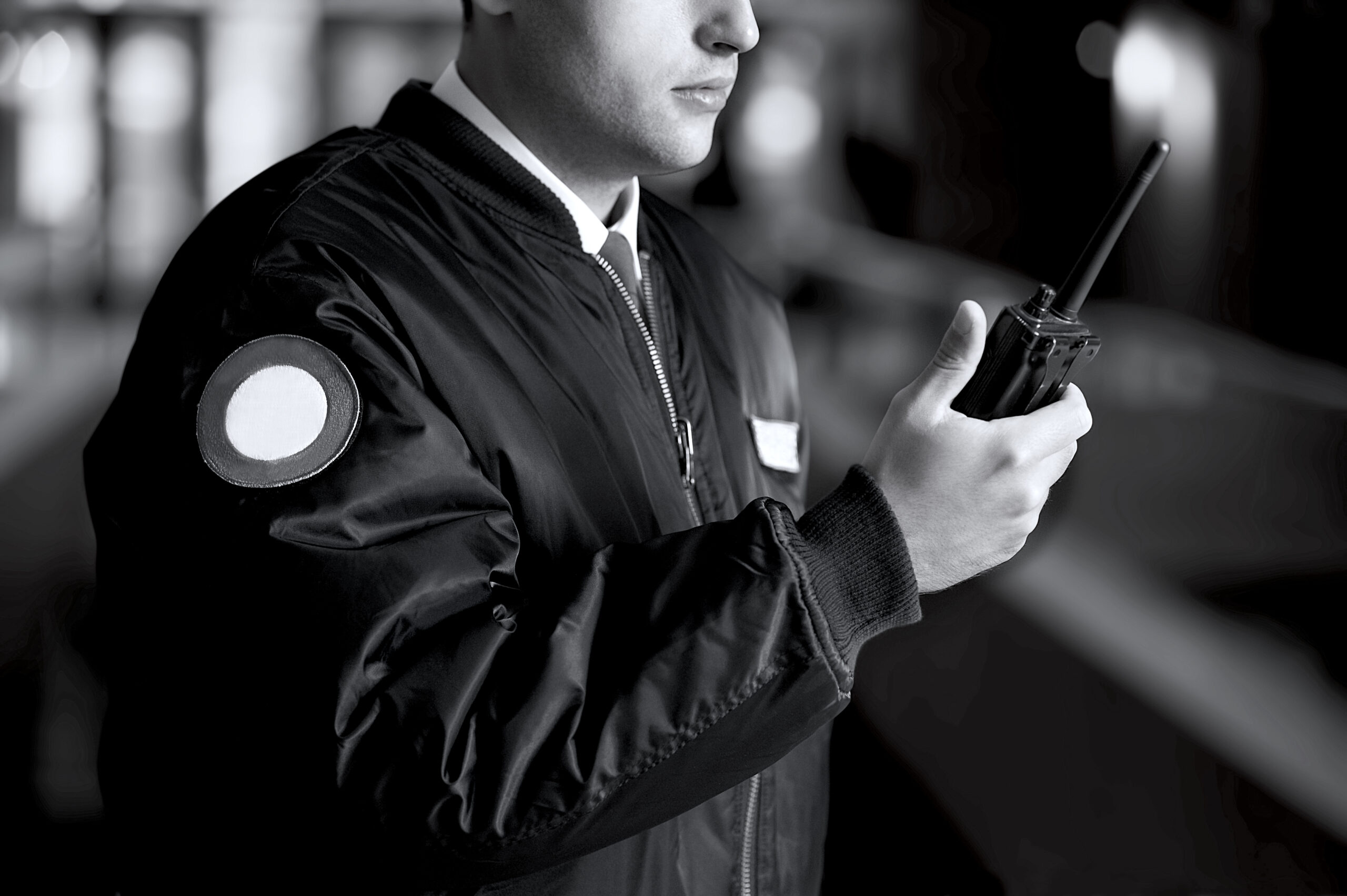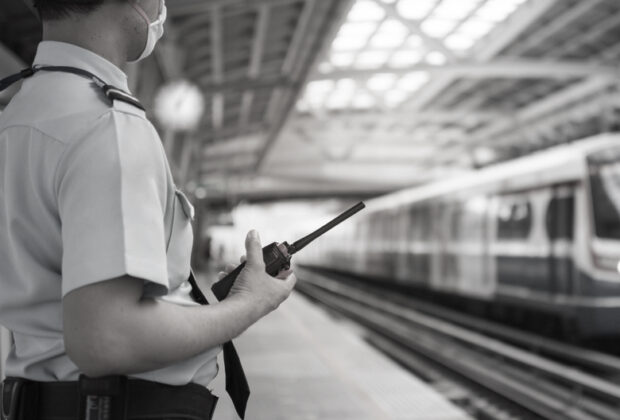When you’re looking for security guard training, start by arming yourself with information.
Security guards in Canada have to train and be licensed. That’s why it’s so important to first know whether a job as a security guard is right for you and to find the right place to receive your security guard training.
This article will help you understand the work of a security guard, including:
- Roles
- Responsibilities
- Salaries
- Career opportunities
- Job market outlook
- Qualifications, skills and characteristics needed
Read on to learn whether a job as a security guard is right for you.
The Role of Security Guards
The work of a security guard is similar to the work of a police officer. Their role is to protect people, property and information. However, security guards are not members of a policing service. They are hired to provide security in addition to what police already offer.
Sometimes security guards are referred to as security service workers or security officers.
The Government of Canada Job Bank website lists the job titles of security guards as:
- corporate security officer
- private security officer
- gate attendant – security
- airport security guard
- armoured car guard
- security guard
- pre-boarding security guard
- postal inspection officer
- store detective
- house detective
- alarm investigator
- night guard
- automatic teller machine (ATM) guard
- private investigator
- retail loss prevention officer
- theft prevention officer
- bodyguard (except police)
- commissionaire
Security guards may be employed by public or private entities. They are needed in a wide variety of businesses, in government and not-for-profit organizations.
As a security guard you may find work at:
- Job locations such as offices, banks, factories or construction sites
- Residences, including condominiums and private estates
- Medical or care centres such as hospitals, clinics or retirement residences
- Educational institutions, including colleges, private schools or universities
- Public institutions like museums or galleries
- Event sites, such as stadiums, concert halls and race tracks
- Commercial businesses, including shopping malls and hotels
- Transportation hubs, like airports, ferries, bus and train stations
The work environment of security guards varies from role to role. As a security guard you may:
- Work with many different types of people
- Often work alone, or work with a partner or in a team
- Have shifts during the day, evening, nights or weekends
- Work at the same location every day or travel from site to site
- Usually sit, stand, walk or drive
- Use technology often or rarely
The variety of roles is part of what makes the job of a security guard interesting. With the right security guard training, you can find the right job in the industry for you.

Responsibilities of Security Guards
A security guard’s responsibilities can vary. In general, they include:
- Observing
- Obtaining statements and collecting information
- Reporting
- Deterring and detecting crime
- Investigating unlawful acts and safety issues
- Collaborating with the police
- Maintaining good public relations
- Greeting the public, providing information and directions
- Ensuring safety and emergency procedures are followed
- Responding to emergencies
- Providing first aid
- Checking ID cards
- Using alarm systems and responding to alarms
- Inspecting packages and vehicles
- Searching employees
- Patrolling the interior and exterior of premises
- Enforcing property regulations, Criminal Code and legislative statutes
- Operating security equipment
- Inspecting equipment
- Controlling traffic and crowds
- Maintaining order and resolving conflicts
- Securing restricted areas
- Facilitating access of vehicles and pedestrians at fixed posts
- Driving and guarding armoured trucks
- Finding and reporting safety hazards
These responsibilities all revolve around protecting people, property and information.
To protect people, security guards may:
- Patrol areas
- Identify hazards
- Control who can enter locations
- Escort employees or clients
- Control crowds
To protect property, security guards’ responsibilities can include:
- Preventing vandalism and theft
- Identifying risks of water damage or fire
- Keeping intruders out of sensitive areas
To protect information, security guards may:
- Be required to keep information confidential
- Protect access to areas with confidential information
- Watch people working in restricted areas
- Guard computer areas
- Look out for unusual behaviour by people who have access to secure information
- Escort people through restricted areas
As you can see, security guards have extensive and diverse responsibilities. That’s why a quality security guard training program is so important.
What Salary Can You Expect?
Average Salaries for Security Guards in Canada
The salary of a security guard can depend on location and responsibilities.
According to the Department of Employment and Social Development Canada:
- Hourly pay for security guards ranges from $11.50 to $24.86
- The median hourly wage* is $15.96
These hourly wages are based on 2016-2017 data from Statistics Canada. (See table below from the Government of Canada Job Bank site.) Across Canada there have been minimum wage increases in 2018. The hourly wage for security guards will reflect this change.

Most security guard jobs in Canada are full-time. Many offer benefits. According to a survey by Payscale.com:
- 67% of respondents in security guard roles had medical benefits
- 63% had dental benefits
- 48% had vision benefits
* The median is what the middle 80% of security guards make.
Higher Paying Jobs for Security Guards
Security guards can make much more than the average wage, even without extensive experience or intensive security guard training.
In Ontario, an employer was recently hiring for several security guard positions. These positions were listed as full-time, temporary and contract. The weekly salary offered was $1,560.00 plus a spending allowance of $30/day for meals.
At 50 weeks per year, this pay adds up to $78,000 per year full time! And all you need to apply is one year of experience as a security guard and a security guard licence.
At the time of writing this post, a major Canadian grocery retail chain was hiring Loss Prevention Representatives. The salary estimate for these jobs was $50,000.
This is excellent pay for loss prevention (aka preventing shoplifting)! And all you need to apply for this job is a security guard licence. The job ad says you should also have a “basic understanding of the of Criminal Code of Canada, Trespass to Property Act and Powers of Arrest and CCTV and/or surveillance systems”.
In some cases, higher pay comes with travel, longer shifts (12 hours), holiday and weekend shifts. The work may also be more challenging.
If you’re willing to get licensed as a security guard to work in Nunavut or the Northwest Territories, pay is significantly higher in these regions at a median wage of about $22 to $25 per hour. (See Government of Canada statistics in table above.)
Higher paying jobs for individuals with a security guard license are available. To get them, you need experience and to invest in ongoing professional development.
We’ll discuss the career path, below. We’ll also explain how to advance to a more senior role in security.

Career Advancement Opportunities for Security Guards
Security guards can advance to more senior positions in security.
Experienced, qualified security guards can become:
- Supervisors
- Team Leaders
- Trainers
- Managers
- Security specialists
- Directors
- Heads of Security
Many of these jobs are very well paid. A typical supervisor job role pays $35 per hour, according to Indeed.ca. Many management/team lead positions pay about $50,000 per year.
When this article was written, there was a Head of Security job posting in BC offering a salary of $80,000 — $100,000. Only secondary school was required for this position, but the employer did expect work experience.
If you prefer to branch out, you might apply for work in related fields, for example with job titles like:
- Private investigator
- Sheriff
- Special constable
- Peace officer
- Protective services officer
- Enforcement officer
- Transit safety officer
- Correctional officer
- Parking enforcement
- Transit fare inspector
Security Services Job Growth
While some job markets in Canada are shrinking, demand and supply for licensed security guards is nearly balanced.
We say “nearly balanced” because there are slightly more jobs open than job seekers.
From 2017-2026, the Government of Canada expects there will be:
- 47,400 new security guard job openings
- 45,500 job seekers
In other words, there will be no shortage of jobs for security guards.
Jobs for security guards open as businesses grow and as existing security guards retire. This means there is never a bad time to enrol in security guard training.
A good economy helps, but many experts say these jobs are “recession proof”. Companies often need security services even more during an economic downturn. That means a job as a security guard can offer stable employment even as the economy shifts.
Qualifications, Education and Experience
In Canada, you must have a licence to work as a security guard. To get a licence you must:
- Be 18 or older
- Legally able to work in Canada
- Take an accredited basic security guard training course
- Pass the exam
- Apply for a licence
Security guard licensing is handled by your province or territory. The rules and process for getting licensed varies across Canada.
We have published guides on getting licensed in Ontario, Manitoba, Saskatchewan and Alberta. Canadian Academy of Guard Training courses are valid in these four provinces.
Generally, you must have a high school education and be fluent in English.
You may also need to have a valid driver’s licence.
You must have a criminal record check to apply for a security guard licence. If you have a conviction, you may not be issued a security guard licence.
Good vision and hearing are important. Some security guard jobs require more strength and fitness. You may need to walk often and be able to work long shifts. Often knowledge and skills are more important.
Having more experience in security will improve your chances of getting the job of your choice. Taking advanced certifications will also help you get a higher paying position.
Key Skills & Characteristics of Successful Security Guards
Security guards draw on a range of skills to perform their responsibilities. They need to master the techniques of their role. A successful security guard will also have social skills to deal with a variety of people.
In Canadian Security magazine, Floria Chiu, Director of Customer Care, G4S Canada says:
“I’m really seeing a shift to the soft skills as opposed to the hard skills. I think the uniform that was once able to effect action and change now has to be coupled with soft skills like emotional intelligence, awareness around mental illness, being able to understand cultural differences — I think those are all key components of a security guard’s job now.”
In the article, several security leaders were quoted saying soft skills are very important. These include customer service skills and the ability to deal with mental health issues.
At the same time, experts say security guards need advanced intervention skills — the security side of the role. Technical skills are also increasingly important.
If you are considering enrolling in security guard training, review the below skills. Consider which you already have and which skills you will need to develop.
Basic security guard training will help you develop core skills. Advanced training can improve your soft skills and your overall competence as a professional security guard.
Key security guard skills include:
- Observation
- Active listening
- Asking the right questions
- Retaining information
- Reporting verbally
- Writing reports
- Communicating effectively with a wide range of people
- Resolving conflicts
- Quickly analyzing, making decisions and responding
- Staying calm in stressful situations
- Behaving professionally
- Following routines and procedures
- Operating equipment
- Working independently, in pairs and teams
The government of Canada Job Bank website lists the skills needed to work as a security guard. They are organized into the following nine categories.
Reading:
- Read logbook entries and short notes, e.g. read logbook entries and short notes from co-workers to learn about events that occurred during other shifts.
- Read short instructions on forms, e.g. read short instructions to learn how to complete incident report forms.
- Read short reports, e.g. read short reports to learn the details of security incidents.
- Read information sheets, e.g. read information sheets to learn security and surveillance techniques for underpasses and tunnels.
- Read email and memos, e.g. read email messages and memos from supervisors to learn about changes to operating procedures and schedules.
- Read instructions and best practice procedures, e.g. read emergency response procedures to learn how to correctly respond to medical emergencies, fires, hazardous material spills, bomb threats, hostage situations, storms, gas leaks and acts of terrorism.
- Read security alerts and bulletins, e.g. read detailed security bulletins issued by police departments to learn about potential terrorist threats and how to report suspicious activities.
- Read equipment and operating manuals, e.g. read operating manuals for the set-up and use of electronic surveillance equipment.
- May read regulations, e.g. read sections of the Trespass Act to learn which premises are covered by the legislation.
Document Use:
- Locate data in lists and logs, e.g. locate the names of authorized visitors, dates and times of incidents in daily logs.
- Enter data into daily logs, e.g. enter data, such as equipment identification numbers, times, odometer readings, addresses and locations, into log books.
- Complete a variety of forms, e.g. enter information, such as names, dates and times, in incident report forms.
- May interpret maps and floor plans, e.g. interpret floor plans to locate entrances, exits and security threats.
- May study images generated by security cameras and scanners, e.g. study X-ray images produced by scanners to locate prohibited goods, such as knives, explosives and firearms.
Writing:
- Write reminder notes to themselves about tasks to be completed.
- Write short notes to coworkers, e.g. write short notes to co-workers to inform them about faulty video display units.
- Write short text passages in log books, e.g. describe noteworthy incidents in log books at the end of shifts.
- Enter comments on a variety of forms, e.g. write comments in fire alarm and police statement forms.
- May write detailed accounts of incidents, e.g. write detailed accounts of events involving people in distress, violence, thefts and security breaches.
Numeracy:
- May pay for cash-on-delivery parcels and receive change.
- May record totals of denominations of money delivered to banks or bank machines by armoured cars, keeping separate totals for American or other foreign currency.
- May measure distances at accident and crime scenes.
- Estimate the height and weight of people.
- May calculate summary statistics, e.g. calculate the number of false alarms received each month.
- Estimate the extent of damage at accident and crime scenes.
Oral Communication:
- Make and listen to announcements over two-way radios.
- Talk to suppliers and delivery personnel, e.g. talk to delivery personnel to determine the content of parcels.
- Talk to members of the public when providing access to a building or grounds.
- Exchange information with co-workers, e.g. speak with co-workers to coordinate activities and learn about incidents.
- Discuss building security with clients and building owners, e.g. discuss security concerns and the features and limitations of electronic surveillance systems with building owners.
- Provide detailed descriptions of events and people, e.g. provide police officers with detailed accounts of events that occurred during robberies.
- Defuse and de-escalate confrontations with hostile and uncooperative people, e.g. use appropriate language, gestures and tone of voice to de-escalate potentially violent situations.
Thinking:
- May choose routes, areas and locations to patrol.
- Locate phone numbers of tradespersons and contractors by looking in phone directories and by conducting online research.
- Encounter equipment malfunctions, such as faulty electronic surveillance systems. Security guards attempt to troubleshoot faults and repair the equipment. If unsuccessful, they contact supervisors and repair technicians and stand by for further instructions.
- Encounter hostile and uncooperative people. Security guards attempt to ensure the security of themselves and bystanders. They seek the assistance of co-workers and police officers as required.
- Decide the order of tasks and their priorities, e.g. decide the order in which to conduct security sweeps using the best available information.
- Evaluate the operating condition of equipment, e.g. evaluate the operation of surveillance equipment by considering factors, such as the quality and usefulness of images and recordings.
- Deal with routine operations and make rounds to respond to emergency situations, e.g. deal with intruders or major equipment failures. Planning is usually short term. Most situations, even emergencies, involve well-established procedures.
- Refer to floor plans and conduct security sweeps to obtain information about exits and fire doors.
- Locate security and repair procedures by looking in a variety of manuals and by speaking with suppliers and co-workers.
- Encounter emergencies, e.g. encounter people experiencing medical emergencies. Security guards deliver appropriate first aid measures and contact emergency responders at the earliest opportunity. They continue with their first aid measures until emergency responders arrive.
- Choose security and emergency response measures, e.g. decide how to safely and effectively contend with suspicious activities, intruders and thefts.
- Evaluate safety and security threats. Security guards consider the behaviour of people and the risks to property and bystanders. They observe the location of exits and take note of burned out lights, blocked emergency exits and other potential hazards.
- Evaluate the severity of emergencies. Security guards evaluate the condition of people in physical and emotional distress to determine the most appropriate course of action.
Digital Technology:
- Use calculators and personal digital assistant (PDA) devices to complete numeracy-related tasks, such as summing the value of bank deposits.
- May use electronic surveillance equipment to monitor codes, alarm systems, buildings and the activities of people.
- May use X-ray scanners and metal detectors to locate prohibited goods, such as knives, explosives and firearms, in packages and concealed under clothing.
- May use word processing software to prepare reports.
- May use databases to retrieve client information, such as names, addresses and telephone numbers.
- May use specialized security databases to retrieve previously completed incident reports and input new ones.
- May use communication software to exchange email with clients, building owners and co-workers.
- May use the Internet to access security alerts and bulletins issued by police departments and other security organizations.
- May use specialized Internet applications to complete and submit electronic incident reports.
- May use the Internet to access training courses and seminars offered by trainers, suppliers, colleges, employers and associations.
- May use electronic surveillance equipment to produce VHS, CD-ROM and DVD copies of surveillance footage captured by security cameras.
Next Steps
Work as a security guard in Canada has many advantages. As a licensed security guard, you can enjoy:
- A growing job market
- Entry-level job openings that pay above minimum wage
- Many full-time positions with full-time benefits
- The option to choose part-time, contract or occasional work
- Jobs where you may be able to choose between shifts during the day, evenings, weekends and nights
- Access to a profession that doesn’t require a related diploma or degree
- Jobs open to those with limited work experience (or limited Canadian work experience)
- Challenging, interesting work where you can grow and develop valuable skills
- Job openings with employers who will invest in your ongoing development
- Opportunities for career advancement to high-paying roles in security
There are many reasons to choose a job in security!
If you’re considering becoming a security guard, review our articles on licensing in Ontario, Manitoba, Saskatchewan and Alberta.




Comments are closed.